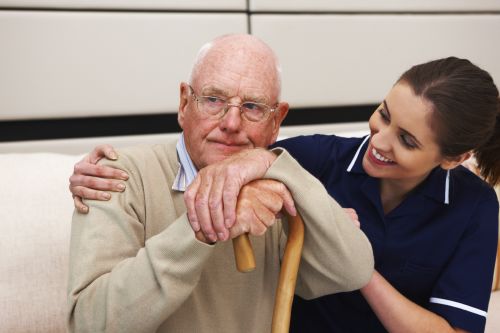Guiding a loved one with dementia toward the right kind of care
 It’s perhaps the most insidious of all diseases. Dementia doesn’t sicken the body. It steals the mind, slowly robbing an individual’s very essence, their personality. All that makes them who they are.
It’s perhaps the most insidious of all diseases. Dementia doesn’t sicken the body. It steals the mind, slowly robbing an individual’s very essence, their personality. All that makes them who they are.
Up against this kind of foe, families often need help for a loved one with dementia. But how best to guide a loved one frightened by their own mental lapses toward the right kind of care for their worsening condition?
It can be a delicate process. But it should begin when families first notice profound changes in an older loved one’s behavior, appearance or habits. The next step is seeking out the proper medical testing to confirm a dementia diagnosis.
It’s often said that dementia in its many forms isn’t simply forgetting where one put the keys. It’s not remembering what the keys are for.
 Debbie Haas, director of skilled-care admissions and the 21- bed Ellenberger Unit for those with dementia, advises family members to be aware of subtle changes in a loved one’s usual routines. Are bills going unpaid? Is their hygiene slipping? Are they wearing the same clothes? Not eating well? Forgetting to take their medicine?
Debbie Haas, director of skilled-care admissions and the 21- bed Ellenberger Unit for those with dementia, advises family members to be aware of subtle changes in a loved one’s usual routines. Are bills going unpaid? Is their hygiene slipping? Are they wearing the same clothes? Not eating well? Forgetting to take their medicine?
Family members who live nearby will be in the best position to notice these early signs. Those who live further away will have to ask more detailed questions during phone conversations, or check with friends and neighbors to ask after a loved one.
“It’s easier to cover things up on the phone,” notes Haas. “You’re not going to ask the day’s date and who the president is. You ask what you did today. And people try to compensate.”
Preparing to begin the conversation: Do a little research first
Once warnings signs are detected and a medical diagnosis is established, it’s time to begin a conversation about a loved one’s future care. But first, families should get familiar with the facts on the progression of dementia and Alzheimer’s.
“Gather information,” Haas encouraged. “Know what to expect, and know what the care is like.”
 She recommends resources like the Alzheimer’s Association and the dementia care book, entitled “The 36-hour Day.”
She recommends resources like the Alzheimer’s Association and the dementia care book, entitled “The 36-hour Day.”
Still, beginning the conversation with a loved one with dementia is difficult for so many reasons. But since the loved one’s mental abilities will only get worse with time, it’s important to begin a dialogue as soon as a diagnosis is confirmed.
The best strategy is to simply state the facts, Haas said.
“You say, ‘these are the things I’ve noticed’,” Haas says, advising family members to objectively detail the behaviors of their loved one. “Tell them, ‘we are all going to have difficulty living on our own at some point. Maybe it’s time to think about what to do next.'”
Don’t expect that first conversation to settle the matter. Far from it.
“It’s difficult,” Haas acknowledges. “People are in denial about their level of dementia. Maybe they are at the point of having delusions or blaming other people for what is happening. They might say, ‘You are making this up.’ You can have extreme denial about the confusion. Others do see they are having trouble and they get to the point of acceptance in their dementia. But taking a person out of their home is a hard thing.”
Once a family begins the dialogue with a loved one, it’s important to keep at it.
Timing counts when talking to a loved one with dementia about care options
Even the time of day can make a difference when reasoning with a loved one with dementia. Mornings are best. And never approach someone who is irritable or openly hostile. Wait for the right time.
 “Read the patient,” advises Haas. “As the day progresses, they get more confused. We call this sun-downing. As the day goes on, as they are more tired, it does change them. Gauge when your loved one is more awake and lucid. Don’t bring it up when they are frustrated, or you are frustrated. Bring up the conversation when everyone is clam.”
“Read the patient,” advises Haas. “As the day progresses, they get more confused. We call this sun-downing. As the day goes on, as they are more tired, it does change them. Gauge when your loved one is more awake and lucid. Don’t bring it up when they are frustrated, or you are frustrated. Bring up the conversation when everyone is clam.”
It’s also advisable for the family to obtain medical and financial powers of attorney, along with a living will as soon as possible. Because sooner or later, the family will have to make decisions for the loved one with dementia. It’s just a reality of the disease.
“If they can be involved great, but in the end you going to have to make the decisions,” Haas points out. “Because they will not be able to.”
It’s also recommended that families begin researching and visiting skilled and dementia care facilities as soon as a loved one is diagnosed. Progression of the disease is different for every patient, and there is no telling how quickly a person may need care.
At Homeland Center, families can put in an application for their loved one and then place it on hold for their future medical need. This ensures the right care is available when it’s needed.
“We recommend the family puts an application in,” Haas says. “I’m not calling them every time a bed comes open, but they can call me when they are closer to needing this level of care. Then, they probably will be at the top of the list, or close to it. So apply, and ask the facility to hold the application.”
Because dementia is a progression. And so is finding the right level of care for a loved one dealing with dementia.


